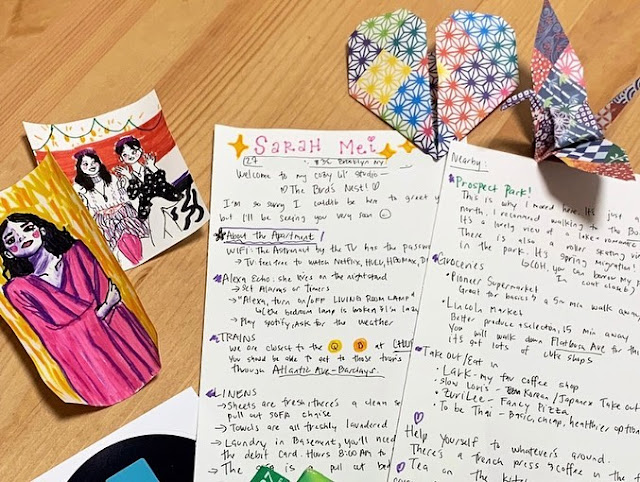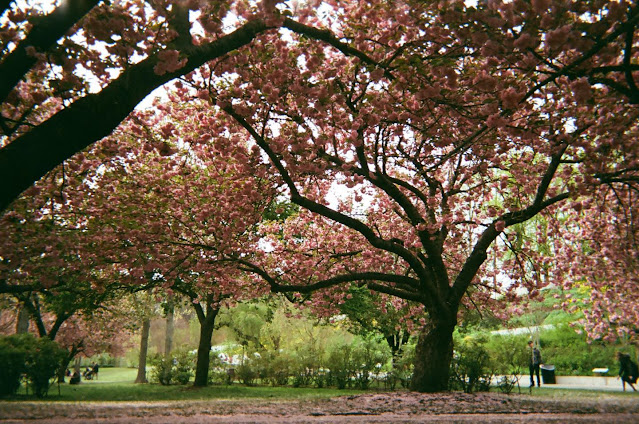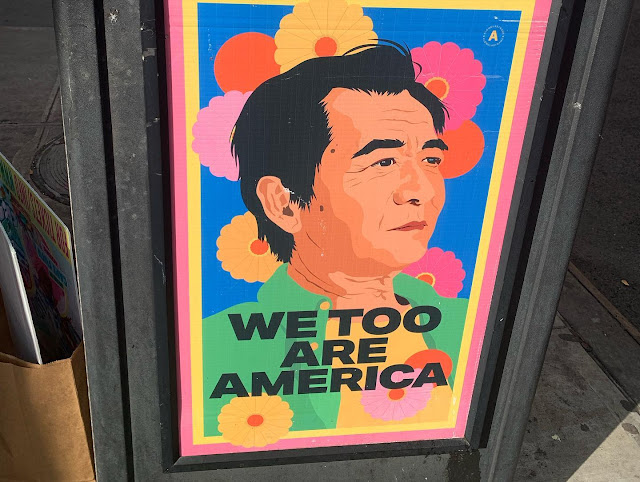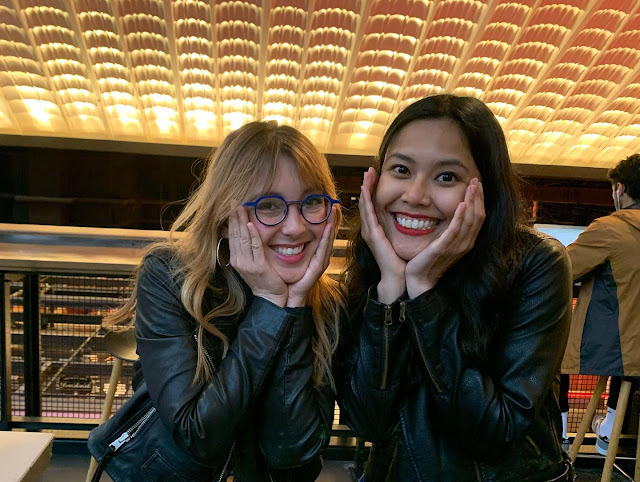So about two weeks ago, I turned 35 years old (!!! what the heck), on May 11.
My birthday was on a Sunday, but on the Monday right after, my team and I were going to leave for Senegal for our research project, so I planned to celebrate it one day earlier. When I woke up on the 10th, Alessia came into my room and told me I had to wake up. I got a little flustered as I'd already set an alarm so we could get to my birthday high tea in Victoria on time, and she was in my room even earlier than that.
Alessia used my phone to film me, and told me to watch a nine-minute clip on her own phone. She introduced it, and she'd collected birthday wishes and messages from some of my very favourite people in all the world. When it got to my family members in Singapore exclaiming "happy birthday!" altogether, I literally started bawling and had to pause watching the video. It was my fourth birthday away from my family, and I've missed four of my birthday celebrations, as well as all of theirs.
It contained the loveliest thoughts and expressions from my inherent family in Singapore, and my found family in Canada. There were heartfelt notions from people who don't usually show outwardly affection, there were funny inside jokes from my cousins who visited me in Vancouver last summer, I had new and old friends in Canada saying the sweetest things about and for me. You probably know I am a person of words, so I appreciate words, all the time.
Once we'd gotten ready, Clio picked us up in her car and we started our road trip to Victoria. We started singing along to some old school songs, and it made me think of when Clio and I were in our first class together last semester. I loved when Clio would answer Michael's questions, because she has such an ethereal voice, it always calmed me, so it was so lovely to have her driving and singing next to me, as we were on the way to celebrate my birthday.
We eventually got to Butchart Gardens in Victoria. It was my first time there, and the start of May is a great time for a visit. It's got all sorts of bright, colourful, interesting flowers at the prime of their bloom. We got seated at our table in The Dining Room for high tea. It was a busy weekend, with all the families celebrating Mothers' Day (as happens during my birthday every year), but our server was extremely attentive and detailed. I really appreciated her making us all feel settled and taken care of, even with a couple of different dietary preferences.
After we'd finished our tea, we took a jaunt around the gardens. Sydney started making up her own names for all the plants, and each one had some sort of euphemistic meaning to them. My friends being on generally the same wavelength as I am, they went and sized up bushes, feeling how sturdy they were, etc. Some of my friends couldn't make it, because it was the start of summer and people had begun leaving for vacations, etc, but for all the ones who were there, I was so thoroughly happy with how everyone got along.
We talked about books, about "reverse racist" jokes, vampires, copulating dragons, leftist men, all the things I love to think and talk about. They know that I'm manifesting meeting the partner of my dreams, so at three different times, three of my friends proposed to me, and I accepted all three proposals! At the end of the day, I asked to have ice cream, so we got some at Parachute Ice Cream before leaving Victoria. It was the perfect birthday celebration of my dreams.
Thank you to everyone who was involved in it (by sending in a video message to Alessia), thank you especially of course to the bestie Alessia for putting in the time and effort in compiling the clips, thank you to the people who went to Victoria with me, thank you to all the messages over any medium, and thank you for your kind thoughts, always!
On the way over to Senegal, and whilst I was adjusting to the jet lag here, I started and finished reading The Original Daughter by Jemimah Wei (she goes by Jemma, though). It's an intriguing story about sisterhood and betrayal between sisters, the anger that ensues, the fracture of family ties.
We've been here twelve days and despite all the stories we'd heard back while we were in Canada, and all the research we'd done, Senegal hasn’t been as hot as we expected. I mean, it's obviously warm compared to Canada, but it hasn't been unbearably scorching and it's been more like when the PNW is easing into its summer. The temperatures have been ranging from 25-30 degrees Celsius, which isn't even as bad as Singapore. Also, Singapore is more humid than it is here, so it hasn't felt as sticky as it would be in Singapore.
I wonder if it's subconscious racism, that people in the Western world don't want to travel to an underprivileged, exploited continent like Africa, so the perception is that it's blazing hot, and desert-like, with no reprieve. As far as I remember, I would not be able to stay out in the sun in Singapore without soaking through my clothes in sweat, and that doesn't happen here, so it's much less uncomfortable. However, no one refrains from traveling to Singapore based on its sweltering, sweaty weather, because we're known for our "modern buildings" and such. Just imperialism and capitalism doing their thing, as always.
Speaking of exploitation and lack of privilege, it's been heartbreaking to see. The sights here bear such a stark resemblance to articles I've seen of bombed sites in Gaza. The buildings have gaping holes in places, there are piles of rubble everywhere, sanitation issues abound, St Louis faces a scarcity of clean water, no proper sewage and treatment systems. These all still exist here pervasively a hundred, two hundred years after the colonization and pillage of Africa, and any progress/development is sluggish, if it is at all happening. And now, at the exact moment I type this, the plunder is happening in places such as Gaza.
Sometimes I watch people immersed in their vacations in Europe, enjoying the spoils of everything those countries have extracted from places like Africa, with all the present-day tourism still contributing to it and injecting more into their economies, whilst African and other exploited nations are still lagging far behind. It’s disheartening, and I don't know what to do or say, and it's not like I don't want to visit Europe and see their charming sites and lives. It's not like I didn't just travel to New York, one of the most capitalist and exploitative places in all the world. All this to say, the depression in me is kept exactly at bay with the precise dose of escitalopram I'm prescribed, and I'm trying my best to balance everything I know and feel, with what I can do for this Earth.
The first day we went to the university (L'Université Gaston Berger) was last Friday. Senegal is predominantly Muslim and in Islam, Friday is the day for men to congregate for their Dhuhr prayers. It's sort of Islam's most revered day, so every Friday, students are wearing their Friday best. They're decked out in colourful and beautiful clothes, some in bold prints, something I have not seen at VIU in my years there. When Canadians/Vancouverites wear colour in summer, school’s not in regular session, and when I’m in school in fall/winter, most Vancouver fashion is known to be black/white/monochrome. I really appreciated the variety of African/Senegalese fashion.
They've thrown us into university-level political studies classes with Senegalese students, conducted in French, which is crazy, if you ask me. I've never been educated in French as a linguistic medium, and here I am, learning about the colonization of Africa and democratic theories in the language??? Savage. I hadn't felt so stupid in a hot minute. However, if we continue attending classes and being exposed to the language over the next two months, I do think it will help us acclimatize, though I would also appreciate if y'all keep sending me more of your favourite French media (movies/songs/podcasts) to consume.
In our research project, we will be conducting interviews with climate refugees, who have been displaced and relocated to refugee camps, because their homes were destroyed due to coastal erosion. It's quite a complicated and sensitive issue conducting these interviews, because Senegal was a French colony, so the mode of communication in schools and "professional" settings is French. However, in recent decades, Senegalese people have wanted to reintegrate the original and native language of Wolof into their lives and shed their French colonial baggage.
All this to say, when we go to school and when we live at home with our Senegalese hosts, we've been translating between English, French, and Wolof. So.... If you thought trying to broach the touchy topic of people losing the literal roof over their heads and their livelihoods was tough, we now have to do it threefold. You can't see my face but imagine me giving a shaky grin and a thumbs up sign.
Through the week, we have been treated to a few authentic Senegalese foods, some at the university campus, and one meal cooked by Mame. We had yassa au poulet on campus, I had a fataya for breakfast once, and today Mame made us thieboudienne. All three were stunning dishes, and I definitely want to try to recreate any and all of them, when I'm back in Canada, and also for my family in Singapore. Food makes me so happy, seriously, sometimes when I want to give up on life, I think, no, there is so much more delicious food I haven't even tried, how could I deprive myself and my tastebuds of all the different permutations and combinations of flavours that life has to offer me????
A couple of nights ago, I attended VIU's Senate meeting online. It was a spicy session because program cuts were on the table, given the institution's financial failings. Sometimes I really don't understand how the university is still standing, there are obviously nitwits abound, who cannot even create a proper agenda package (whether due to malice nor incompetence, we still do not know, but when it involves people's livelihoods, does it even matter).
I was honestly almost at my wits' end this week. I had to stay up from 11PM to 2AM Senegal time to sit in on a 4PM Senate meeting, Nanaimo time, and sometimes it felt like they didn't have two functional braincells to rub together in the boardroom (although that's not true, because some of the people in that room, I do respect). At 1AM Senegal time, I kept telling myself to breathe deep breaths, and think of Art, and Lauren, and Jocelyne, and Kaia, and Warren, and Sydney, and Janelle, and Sarah, and Alessia, and all the Canadian people with sense, and sensability, and who give me the patience to deal with such rubbish.
The pesky people I work with who don't have spines, I have as much derision for them as I do for the Senegalese mosquitoes that are giving me grief here.
I've been trying to use less of Meta products (because the company is owned by a fascist), so I’m on Mastodon now, and I've also been importing my Instagram posts over to Pixelfed (both Mastodon and Pixelfed are open-source apps, I believe). It's a little challenging, because y'all know I'm always, always rambling. I'm never not rambling. So much of my ramblings have been on Instastories and I think I've built a great community for myself there. I post and consume posts about mental health, anti-racist, anti-fascist, pro-community causes, etc. However, it's definitely self-defeating if these posts are hosted on a platform that's inherently capitalist and fascist. I know this because it censors Palestine issues, and I can see it whenever I post about Palestine, and similar issues. I know people from Singapore and Canada have enjoyed and loved my candid nature, being vocal about things that affect me, or controversial things in the world that really shouldn’t be controversial. However, I keep saying I want to start a revolution and that I would be the first to strike a match to the ground, so I cannot be attached to my Instagram profile of all things, it's not even something that's tangible.
Anyways, before we came to Senegal, I’d been going to the climbing gym at least once a week for two months and there isn’t a climbing gym here (because obviously they've got other things to keep their minds on). When I get back to Nanaimo, I will have to retrain my arms to their baseline strength. Should you feel so kind and generous, you are welcome to gift me either a continued membership to the climbing gym, or French classes, so that I ace my Canadian citizenship requirements and/or am able to work with the government? Much appreciated! Bisous xxxxxx











